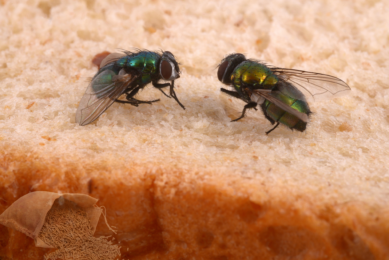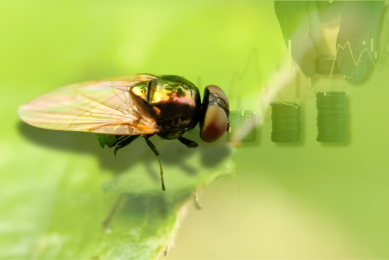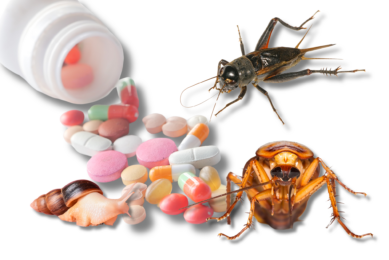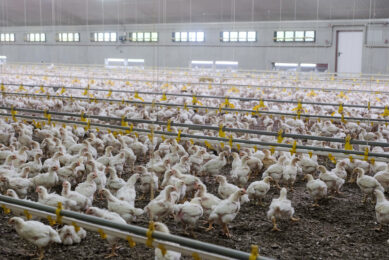Turning flies into valuable feed protein in South Africa
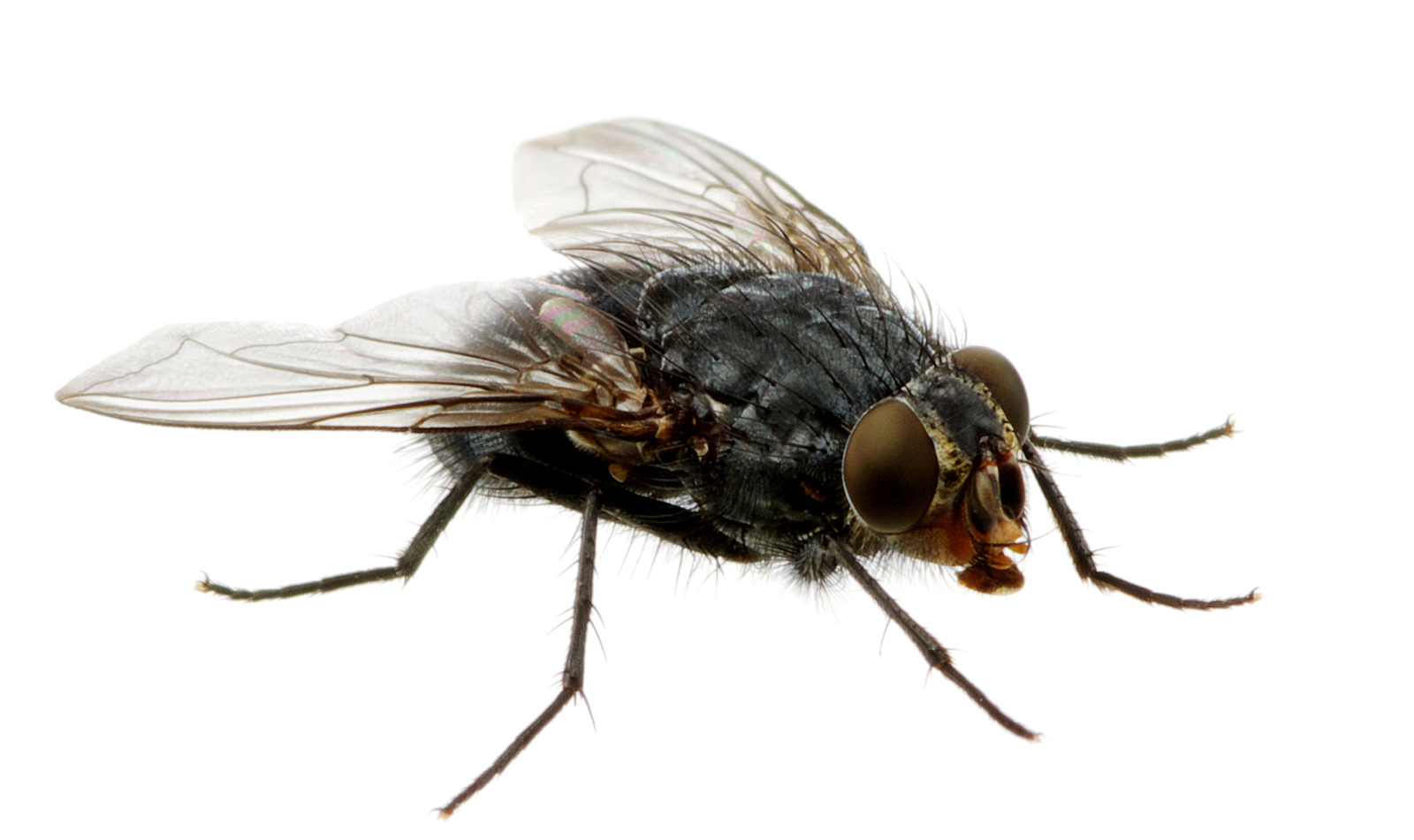
Processing raw materials is not only limited to the usual suspects such as grains and oilseeds. Insects are slowly finding their way into feed formulation and should be processed into valuable feed ingredients. A South African company recently opened a new factory to do just that.
AgriProtein, with offices in South Africa and Gibraltar, is a natural protein feed business. Mimicking nature, using exciting new technology the company is spear heading the new industry of nutrient recycling.
Today we don’t think twice about re-purposing and re-using our old plastics and glass, but little traction has been gained in saving our waste food from landfill. It is not common to discuss the nutrient value or energy cost of producing our organic waste.
Billions of live flies producing 24 tonnes of animal protein per day
After five years of research and development and developing production skills on first a pilot, (P1), and then demonstration plant, (D1), the company’s first commercial factory, (F1) will come on line in April 2015. Each day 100 tonnes of traceable spent organics will be used to produce 24 tonnes of natural animal protein. The company uses billions of flies housed in its factory to lay eggs, which are hatch into larvae and recycle the waste nutrients in the organic waste into larvae protein. F1 will process 22 tonnes of larvae a day (two tonnes are kept back for maintaining the fly colony) into seven tonnes of maggot meal and three tonnes of maggot oil.
9,000 square meter biotech facility
The larvae are reared in a 9,000 square meter biotech facility just next to Cape Town airport where after years of Environmental Impact essays and joint collaboration with the Department of Agriculture and Fisheries, registered, quality controlled animal and fish feed ingredients are produced. The factory process starts with a vast fly rearing colony where the flies are maintained in a secure set of rooms at exacting temperature and humidity levels to create the optimal conditions for mating and crucially egg production. Each day just under three kilos of eggs are collected and placed into the hatchery before being moved into the nursery and eventually to the large grow out rooms. The basics steps of the process are almost identical to the spawn-fingerling-fish processes common is modern aquaculture.
Larvae are separated from the substrate
At the end of the 20 day cycle, the larvae are separated from the substrate in which they are grown and are cleaned and heated before being pressed to remove the naturally high levels of fat, creating a flow of a significant parallel product maggot oil, a simple natural sustainable lipid. The company works with different flies to derive slightly different products and to digest varying waste streams. In its natural form, the larvae of one of the key insect species, the Black Soldier Fly has an extremely high fat content – up to 35%, which is extruded from the larvae in the post processing phase to bring the meal down to just under 12% fat to counter potential rancidity and increase shelf life. The extracted oil is far more than just a by-product and is a significant product line with excellent palatability and wide reaching application as an ingredient and coating in animal and fish feeds.

AgriProtein processes 22 tonnes of larvae a day into seven tonnes of maggot meal (pictured) and three tonnes of maggot oil.
Trials as a fishmeal substitute for fish and monogastrics
In collaboration with the University of Stellenbosch, AgriProtein has for many years been running deep and broad tests into the benefits of the maggot meal as a substitute for fishmeal in starter diets for pigs, chickens and in fish feed mixes.
The research examined inclusion levels, digestibility, gizzard erosion, growth and even end product meat quality and sensory tests. In all cases it was shown conclusively, and unsurprisingly that the simple meal, made only of the natural wild feed of many mono-gastric animals including fish provided a powerful blend of the essential amino acids and crude protein necessary for healthy development.
The company continues to run in house trials and fish and poultry growth projects with global agriculture and aquaculture businesses. Specialist explorations have also been run on more niche markets such as quail, and abalone. It also supplies product to Universities and have supported local aquaculture research with the Stellenbosch University and on Tilapia in Swaziland. The international community of academics have also published results of insect feed inclusions covering catfish, trout, and many other species of fish and foul on all continents.

The larvae are perfectly equipped to recycle the waste nutrients in the organic waste into larvae protein.
Second fly factory in the planning
AgriProtein will build their second factory, (F2) in South Africa breaking ground in the last quarter of 2015. The company raised private capital in 2014 to build F1 & F2, enabled by an exciting seed funding partnership with the Alliance for Green revolution and the KPMG administered AECF venture fund. In addition, first licensees have been agreed in North America, Chile and Australia and the company is tentatively reviewing operations in Europe, waiting on developments in the EU legislation (see box below) as regards insect meal.

BSE regulation is a hurdle
Insect meal is not banned in the EU, however it is also not permitted. As an important reaction to the BSE crisis the EU banned the feeding of all processed animals to other animals to arrest the issue and new potential sources of contamination, only fishmeal was exempted. At the time there was no insect meal lobbying or central representation and as a result no larvae – exemption was sought.
The EU is however currently reviewing the governing laws, and insect meal is already permissible into fish and pet feeds, under certain slaughterhouse conditions. DG Sanco, the European Union’s Health and Food Safety unit has asked EFSA the food safety body to convene a specialist scientific group to review the situation and a statement is expected in September 2015. AgriProtein is confident of a positive outcome, after all – every free-range chicken, and fresh caught fish sold in the EU will without doubt have eaten flies or larvae, their natural feed source. The Insect meal producers do now have a presence in Europe and AgriProtein is a founding partner of the Brussels representations of insect producers IPFF (www.ipiff.org).
To learn more about the role of insects in animal protein, view the Insects Whitepaper




